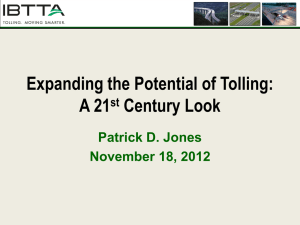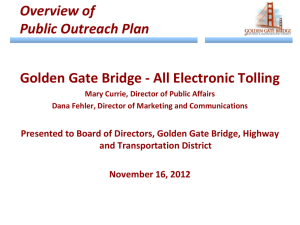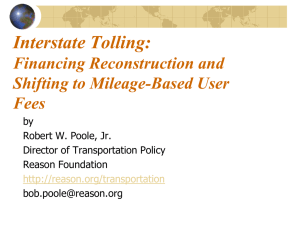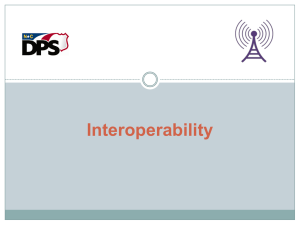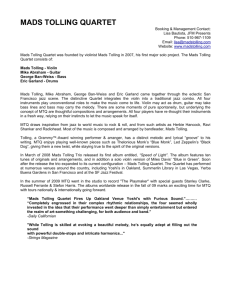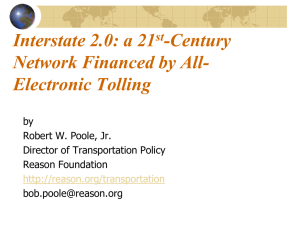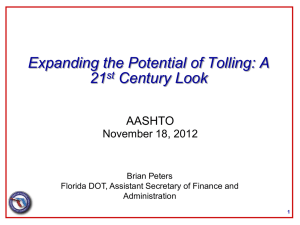presentation
advertisement
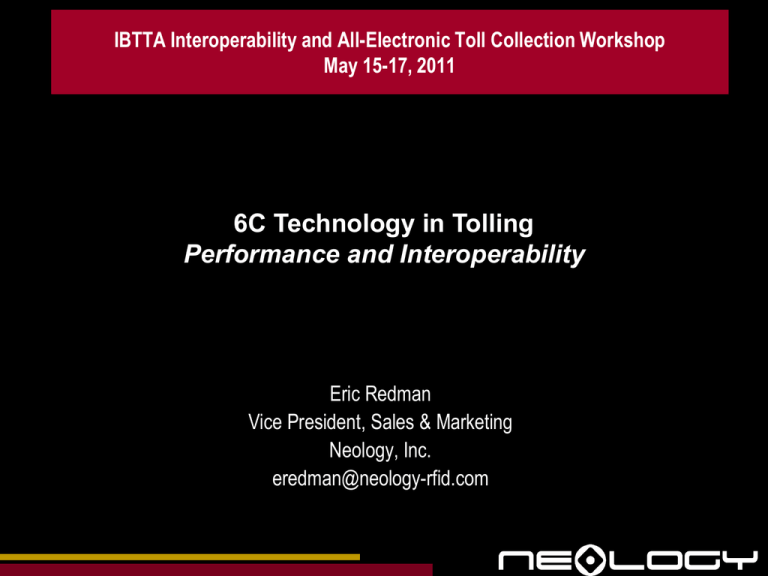
IBTTA Interoperability and All-Electronic Toll Collection Workshop May 15-17, 2011 6C Technology in Tolling Performance and Interoperability Eric Redman Vice President, Sales & Marketing Neology, Inc. eredman@neology-rfid.com Pace of Technological Change Half of YouTube users are under 20 years of age. Over 35 hours of video is uploaded every minute. In an average 60-day period, more video content is uploaded to YouTube than NBC, CBS and ABC combined had accumulated in 60 years. Enough content is currently uploaded to provide 1,700+ years of continuous video. YouTube has only been in existence since 2005. Introduction To Neology Neology is headquartered in San Diego with additional offices and manufacturing in Mexico City. From an early R&D background, the company has focused more recently on vehicle AVI/Tolling. Over 30M tags deployed globally. Substantial experience with 6C technology on vehicles-supplier of the Mexico Repuve program. Is 6C “Low Tech?” Yes, the ISO 18000-6C standard came from efforts in supply chain to replace barcodes-and this is a good thing. This effort and the “Wal-Mart effect” led to massive investment-one provider alone has received $340M in funding since 2004. The challenge of driving costs low while maximizing performance benefits ALL 6C users. As retail volumes have largely faltered, 6C hardware providers have rapidly added other features for new markets like tolling. Is 6C Ready? The U.S. Government has made a massive and sustained investment in the 6C platform. Every U.S. land border crossing (39 sites) are equipped with 6C. New PRC “Green Card” has 6C as do other IDs (EDL, etc.). Military ramping up with 6C in logistics. In tolling/vehicle use, 6C is being rapidly deployed worldwide (Mexico, India, etc.) Mexico chose 6C exclusively for all vehicles (approximately 30 million) in that country. Is 6C Secure? First Question: What security is needed? Methods are available to authenticate the tag on the fly. Some tags can now detect tampering and report to reader. Data security: Traveling database vs. backend. Physical security can be another important measure to implement. Mexico Repuve 6C Experience Mexico sought a platform to cover every vehicle (30M). Exhaustive testing process arrived at 6C as the best technology. Demanding specs: 160 KPH read reliability, 10 year life, secure form and vehicle label. Ambitious program with about two-thirds of the total delivered to date. Initial data and public reaction positive. Interoperability Considerations When choosing any technology platform, you want to choose the dominant standard. 6C has the largest supplier base and is the dominant standard in RFID deployments by far. 6C is a standard for precisely what is sought: interoperability. Huge investment in the 6C platform has resulted in the highest performance and lowest cost. This lower cost allows “massification” of the technology. expensive to sign up a user rather than pursue a violation. Less Interoperability Through Readers Multi-protocol readers are a current favored path. First Question: What protocols? As the three popular tolling technologies all use the 900 MHz band, communication interference can be an issue. In a true ORT environment, two protocols is the likely limit. Inverse relationship between number of reader protocols available suppliers. End result: Increased cost and fewer suppliers. and 6C Pitfalls In U.S. Tolling Installed ETC base is there, but is not 6C currently. Ideal conversion scenario is complete replacement of reader and tag, but this may not be practical for all agencies. Some areas must write data to transponder--increasing complexity and reliability concerns. True value in 6C reduced when other protocols are introduced. platform was designed to be “lightweight.” Most 6C providers have no experience with vehicles. The Why Use 6C In Tolling? Performance – 6C is the newest RFID platform and offers the highest performance chipsets by far. Dominant Standard – 6C platforms allow the largest selection of suppliers for maximum performance at a low cost. Flexible Form Factor – The smaller chip sizes and lower cost available with 6C allow a host of form factors such as flexible substrates, ID cards, etc. 6C Allows “Massification” – The lower cost of 6C allows huge deployments at a moderate price. Opens the door to other valuable services (Parking, EVR, Congestion Charging, etc.) Conclusions 6C technology has arrived and is viable for vehicle use. Promise of interoperability, but the platform works best when staying close to its design mission. Reader side may offer migration path with multi-protocol, but at a price. Important to choose a 6C provider that has experience with vehicles. Overall value proposition of 6C may outweigh barriers to implementation. IBTTA Interoperability and All-Electronic Toll Collection Workshop May 15-17, 2011 Thank You! Eric Redman Vice President, Sales & Marketing Neology, Inc. eredman@neology-rfid.com
